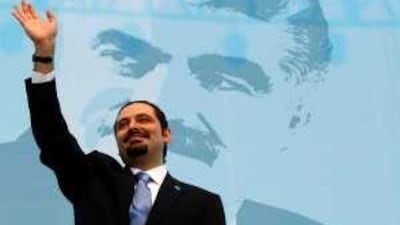BEIRUT // Saad Hariri, the Lebanese prime minister-designate, ended five months of often bitter negotiations with his political rivals yesterday and announced the formation of a national unity cabinet to lead Lebanon's fractious political and sectarian factions. Despite winning a solid parliamentary majority in June's elections, Mr Hariri and his "March 14" alliance of Sunnis, Druze and some Christian parties had to make a major concession to their Christian rivals in the opposition by allowing Michel Aoun's Free Patriotic Movement (FPM) to retain control of the telecommunications ministry, which Mr Hariri coveted, in order to get the deal.
Yesterday was filled with last-minute negotiations within the March 14 camp, as Christians aligned with Mr Hariri and very much opposed to Mr Aoun reacted to the telecommunications concession with outrage and demands for additional seats on the cabinet. Late yesterday afternoon, envoys from the March 14 movement convinced the MP Boutros Harb to join the cabinet regardless of his portfolio, allowing Mr Hariri to deliver a letter detailing the cabinet to the president Michel Suleiman.
Mr Harb had wanted control over the justice ministry but eventually dropped his demand because a close ally will control the seat. The next step before actually taking the reins of government for Mr Hariri - who ascended to the top of Lebanese politics after his father, a former prime minister himself, was killed in a large car bomb in central Beirut in 2005 - will be to draft a ministerial statement. Some observers have expressed concern that the statement might be difficult to agree on by Lebanon's greatly divided majority and opposition, particularly over the right of Hizbollah to continue to maintain an independent military force to fight Israel.
But a one-time close ally of Mr Hariri, who recently defected for a neutral position, said that he doubted the statement would be as hard to draft as it was to select cabinet ministers. "Let's take things one step at a time. Let's first get over with the government formation and then we talk about the policy statement," the MP Walid Jumblatt told As Safir newspaper. "Anyway, I don't think there would be a crisis over it [the policy statement]," the Druze leader said. Mr Suleiman was expected last night to issue three decrees: the resignation of the caretaker prime minister, Fuad Siniora, the establishment of the cabinet with the named ministers, and Mr Hariri's promotion from the designated prime minister to the job.
The breakthrough in the talks with Mr Aoun came after Syria and Saudi Arabia pressured with allies in the opposition and majority to end the dispute over whether Mr Aoun's son-in law, Jibran Bassil, would continue to run the telecommunications ministry. Mr Hariri made an offer that was eventually accepted after much public hand-wringing by Mr Aoun, to allow the FPM to keep the seat if Mr Bassil joined another ministry.
Mr Aoun also faced late pressure from his Shiite allies, in particular the speaker Nabih Berri, who had grown impatient with his negotiating stances after the delays entered the fourth month. The cabinet will be formed around a compromise ratio demanded by Hizbollah, which leads the opposition alliance, to give the minority a one-seat margin to overrule major cabinet decisions. The militant Shiite group has refused to participate in a cabinet that would have the authority to order the group to disarm.
Under the new cabinet, the majority led by Mr Hariri would control 15 seats, while the Hizbollah-led opposition will control 10. Allies of Mr Suleiman will hold five seats, including returning incumbents loyal to the president to the critical security ministries of interior and defence. Although Hizbollah's weapons, sectarian tensions between most of Lebanon's 18 official confessionals and the prospect of a possible war with Israel looming are all critical issues for Mr Hariri, perhaps the toughest challenge of the new government will be to manage Lebanon's US$50 billion (Dh184bn) national debt, which is the highest per capita in the world.
mprothero@thenational.ae

